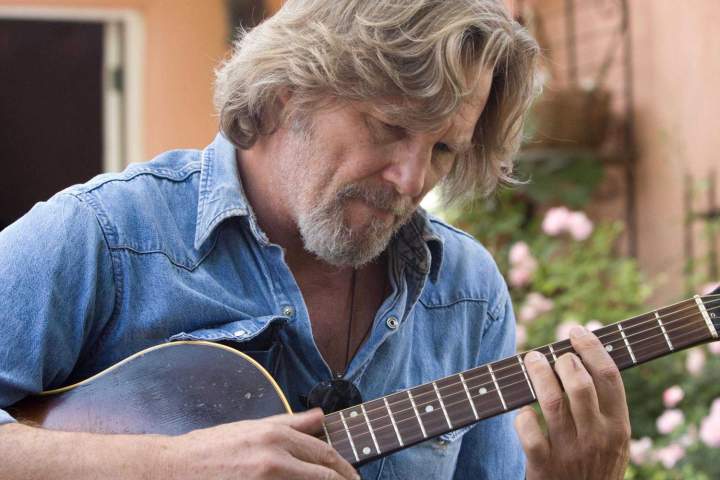 As an old school, hard-living country singer named Bad Blake in Crazy Heart, Jeff Bridges gives yet another solid performance, playing a man who was once successful but who has almost blown all his chances to get back on top. It also stars Maggie Gyllenhaal, Colin Farrell and Robert Duvall.
As an old school, hard-living country singer named Bad Blake in Crazy Heart, Jeff Bridges gives yet another solid performance, playing a man who was once successful but who has almost blown all his chances to get back on top. It also stars Maggie Gyllenhaal, Colin Farrell and Robert Duvall.
But Crazy Heart is really all Bridges – from top to bottom. He just received a Golden Globe nomination for the performance, and many pundits – including myself – are predicting this could be the actor’s year to bask in the award season’s light; that he may finally snag the Oscar he’s been poised to win ever since he was nominated for his turn in The Last Picture Show (he’s been nominated three other times for Thunderbolt and Lightfoot, Starman and The Contender).
We journalists had a brief but meaningful conversation with Bridges about singing in a movie for the first time, similarities between country singers and actors – and who his mentors have been in his career.
Step 1: Sing your heart out
Jeff Bridges: “When I first got the script, there wasn’t any music attached to it. So I kind of took a pass on it. Then when I found out from my good buddy T-Bone [Burnett] that he was going to do it if I was going to do it, then that filled in that empty missing piece. So when he got involved, I knew the music was going to be top-notch. That got me to the party real quick.”
Step 2: Being on the road ain’t easy
Bridges: “Yeah, my wife told me, ‘You know we’ve been apart 11 months this year.’ 11 months, man! That’s tough, that’s the hardest part for me. But we’ve been married 33 years, so we’ve done this a lot together. We know the routine and how tough it is; we depend on each other. It’s great to have a partner like that.”
Step 3: Success ain’t so easy, either
Bridges: “One of the things appealing about country music is dealing with human emotions that people can relate to. I think we can all relate to not only the fear of failure, but the fear of success, too. What we do to ourselves when we get kind of successful and when you get to the top of the mountain, there’s only one place to go. You roll down. So how do you deal with that? A lot of us deal with that by numbing ourselves and that’s our strategy to slow ourselves down. So, I can relate to that just as a human being. Not only as an actor, but just being alive.”
Step 4: Admire those who taught you
Bridges: “Do fathers count as mentors? I guess they do. So my dad [Lloyd Bridges] was my mentor. He really encouraged all of his kids to go into show business, he loved it so much. I remember as a little kid, he’d come up to me and say, ‘Hey, do you want to be in Sea Hunt? There’s a little part” – this TV show he did in the ’60s. And I’d say, ‘Ehhh … ‘ and he’d cajole, ‘You get to get out of school. Make some money to buy some toys.’ [Laughter] So, I’d say OK. And I remember him sitting me on the bed, giving me the basics of acting, teaching me how to do it. Of course, my brother [Beau Bridges] was also my mentor, took up where my dad left off. Worked on scenes to get my agent. I remember a big turning point in my career was doing a movie version of the play The Iceman Cometh. And I got to work with all these masters: Robert Ryan, Frederic March, Lee Marvin. Most of my scenes were with Robert Ryan, who I learned a lot from. About fear and insecurity. I remember doing a scene with him across a table, and we were waiting for the scene to start. He took his hands off the table and there were too puddles of sweat on the table. I was like, ‘Wow, after all these years, you’re still frightened. You’re still nervous and scared.’ He said, ‘Oh yeah, I’d be really scared if I wasn’t scared.’ That thing about fear, it’s always going to be with you, that’s how you deal with that. It’s hopeless to think you can get rid of that.”

